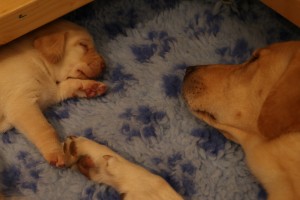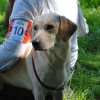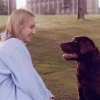A ‘rough guide’ Mating your Bitch
Diana Stevens – Wylanbriar Labradors
Every breeder approaches mating a bitch and breeding a litter differently. There are many ways to go about this, I have found over the last 30 or so years of standing dogs at stud and breeding litters myself these are the most common things asked of me by new breeders. I hasten to say again, this is *my* way of going about things, tweek it to what suits you.
Dear Potential breeder (for indeed everyone who mates a bitch is a breeder, NOT just the big competition kennels of commercial establishments), I am going to presume you are using one of our stud dogs here at Wylanbriar. In presuming that, I am taking for granted that your bitch is hip scored, elbow scored (and the result is 0:0) and holds a valid Annual BVA eye test certificate). I won’t be covering these things BUT I do have an article on these should you wish me to link you to it. It is imperative you hip and elbow score and eye test your bitch before mating her, and the results come back, and you act responsibly on those results. You will also need to DNA test your girl, and her return a ‘Clear’ result, for any condition that your chosen stud dog is a ‘Carrier’ for. Its very simple, please do just enquire, I have testing kits here and its just a simple quick mouth swab and not expensive.
Firstly you need to think if you have the right setup to breed a litter. You will not *really* be able to work full time away from your home, at virtually, any point of rearing the litter, even if you can get home at lunchtime. You will need to be relatively fit and able bodied as it is very physically demanding, both during the mating when I will ask you to hold your bitch steady, and, then, more so, for the duration of the 8 weeks the pups are with you. You will need to be able to set aside a room for the whelping box initially, then for the bigger, active, smelly, pooing pups. Alternately you could move them around 5 weeks of age to an outside shed or kennel. They will make a hell of a lot of a noise several times a day for 5 minutes to 45 minutes usually when hungry, overtired, full of beans, restless, unable to sleep etc etc. This noise, at 6 or 7 weeks from 5 – 10 puppies is ear splitting and can cause neighbour trouble if the pups are outside. It can cause relationship problems and nerves frayed to the edge if they are inside. Take it from me 😉 You cannot overestimate the noise and the mess and smell of a litter of puppies.
So to the questions I am usually asked:
Before Mating.
– Make sure your bitch is up to date with her booster and worming before the mating. Once mated I personally would not touch a bitch with unnecessary chemicals so therefore do not deflea, detick or worm once mated, its completely unnecessary anyway. SO! Do it before. Some vets advise worming two weeks before whelping with Panacur wormer over 3 – 5 days. I have never done this and have never found it necessary. I worm with Drontal plus about a month before mating, then again when the pups have left and that’s it (of course the pups are wormed too as they grow at 3, 5 and 7 weeks of age).
– From about a month before she is due in season start her on 1000mg’s of normal supermarket own Folic Acid to help ward off any skeleton deformities. One tablet once a day is fine (so human dose). Give this through her season and pregnancy and finish around a week before whelping.
– Make sure she is in good physical condition as it will take a LOT out of her even when food is upped considerably whilst rearing the pups. Equally have her as fit as possible as a fit bitch tends to mate, whelp and rear puppies more easily.
– Watch for her season by placing a white or cream sheet over her usual sleeping place – dogbed, sofa, your bed etc. You will then not miss day one of her blood discharge which is crucially important to working out when to go to the stud dog. On day one of her season call and inform the stud dog owner that she is now in season. They will leave you a clear window for mating in the stud dogs ‘diary’. If you do not make this call you cannot expect them to refuse other bitches for yours who may have informed them.
– Do not change the feeding or exercise pattern at all for a bitch before whelping except to ensure she is fed on a easy to obtain, high quality complete food, and that brand has a ‘puppy version’ for you to be able to swap to later in pregnancy and to rear the puppies on. Even if your dog is used to meat and biscuit, change the biscuit for complete adult formula dry dog kibble. Add a little meat to it if you have to make her eat it up but she will need the goodness that complete food gives her which she would have to eat about four truckloads of meat and biscuit or poor quality complete food. I always recommend James Wellbeloved complete dog food.
– Be aware that its unwise to inform your pet insurance company that you plan to mate your bitch. They may then class her as a commercial breeding dog and stop covering her or increase her premium. Be aware that no pet insurance company covers anything to do with mating, pregnancy, whelping or rearing pups. They consider this your choice and your risk.
– The majority of bitches are mated for the first time at around the 12 – 15 day of their season mark. But EVERY BITCH DIFFERS. The stud dog owner can only advise you, they cannot *tell you* when to bring your bitch to them. If they insist on a certain day they could be making a big mistake as some bitches are ready as early as day 7, some as late as day 20/21. You will have to play it by ear. There is a ‘ballpark’ of first mating usually around 12/13, and second mating, 48 hours later at around 14/15, but this is in no way foolproof for every bitch, just the majority. You should be offered two matings 48 hours apart. This is the best chance of getting your girl into pup. There are no guarantees on getting your girl in pup, you pay for the stud SERVICE and not puppies. You will be offered a free return next season if she misses the first time round. It is VERY STRONGLY recommended, that you use Progesterone testing, either by way of your vet or through one of our recommended independent testing companies – Please do ask for details.
– Collect newspapers, you will need, literally hundreds. Do not underestimate how many you will need, around 20 or so a day towards the end of the litter, get others collecting too for you.
– When to come for mating?
The common course of a season for most Labrador bitches is, for around 8 – 10 days they will lose varying amounts of red blood. They will wee quite a bit and hopefully their vulva will swell a little or a lot. It will certainly ‘soften’ to the touch to enable the dog to penetrate. You must be able to personally deal with touching your bitches vulva to check, dabbing her with a tissue and so on and studying her discharge. If not you will really struggle both with the physical intimacy of the mating and most certainly the whelping where being hands on is essential.
Watch the discharge for colour change (the white sheet should remain on her bed to help you here) When the discharge goes more watery red/brown then virtually or completely disappears this is a positive sign. However some bitches bleed right through and some lose so little blood that watching the discharge is impossible. These bitches really will need to go and have a ‘Premate’ test unless you have other dogs at your home (obviously only females or castrated males!) who your bitch flirts with and you can tell she is nearing readiness for accepting a male.
– A Premate test is available at most vets. It is usually a blood test but can be a vaginal swab. The test results will be returned to you the same day and the test should be done in the morning. A test costs around £65-80 usually which is less than a wasted journey will cost you in petrol. The test is to find when a bitch ovulates. We also have more economical independent testing recommendations, for reputable companies, please do enquire for details.
– Most bitches release eggs for around 2 – 5 days in the middle of their season. There is not, with most bitches a tiny window for catching eggs but quite a broad one, hence most healthy females mated by healthy dogs at the right time conceiving (usually around 8 in 10 bitches here conceive on the first try). However mating too early before the eggs are released will render that mating useless as the sperm will find no eggs to fertilize. Mating a day or too late is far better than early because some eggs will still be ‘hanging about’, so the moral of the story is, do not RUSH to the stud dog the minute your bitch appears to need mating. Breath and give it a day or two. Put it this way, in general, FAR more bitches miss if mated only on day 11 than those whose owners mate only on day 16 or 17 if they have a normal ovulation pattern.
The Premate test will tell you if your bitch is too early to mate, whether ovulation is due to occur shortly, or whether it has started. Too early you can test again 48 – 72 hours later. Starting shortly means come in around 48 hours time for your first mating. Already occurring means come that day or the next day for the first mating.
This is not a foolproof test but it is the best science has come up with and is very effective on healthy bitches with normal cycles.
The premate test will also help a bitch on her first mating or one who is known to be difficult to mate because, should she object to the stud dogs attentions in no uncertain terms, it will be assumed, if not Premate tested, that she is not yet ready for mating. However many bitches just don’t like the idea of being mated and can override their hormonal drives. Without a premate test saying ‘she is telling us lies here!’ when objecting, we cannot push for a mating. If she is Premate tested ready but is objecting at Wylanbriar we will continue to do all we can to naturally mate your bitch unless it causes her real distress in which case extra time will have to be given and a return visit, but bitches are rarely different on the second visit to the stud dog if Premate tested ready the first trip. Infact they learn to defend their honour in no uncertain terms by being allowed to ‘walk away’ the first time.
However for a bitch who is well socialized with other dogs of all sexes, most are reasonably compliant about being mated. However be prepared that you will have to hold your bitch steady, head only, by her collar, and you will have to be confident enough even if she is vocal or growling that you must not let her go. Some bitches stand like a rock and are silent for the duration of the mating and the tie. Some are not and are extremely vocal, crying, shrieking, whining, and almost always wiggling and squirming. You must be capable of holding your bitch as steady as possible and comforting her. The mating does not generally hurt but it is a shock to a bitch, especially when they tie, and can provoke some unusual reactions from the quietest calmest girl. Equally the most nervous nelly can take it in her stride and impress everyone with her confidence and tolerance in some cases, but be aware you can never know till you are here!
The Mating
– Bring your bitch in a snug collar. Bring her pedigree and hip, elbow and eye certificates which I will want to see before the mating. Stud fee will be by bank transfer after the first mating.
– Wear suitable clothes for mating which may involve long periods of being on your knees on the floor outside.
– Do not bring children. At Wylanbriar if children do come, they will not be allowed into the mating room as many are upset by the physicality of the mating process and the vocal reaction of many bitches.
– I will ask you here, unlike some other stud dogs owners, to not have your bitch wee until she gets here. This is something for the boy to get himself aroused by and for me to judge his reaction to before we mate.
– We will play the mating by ear, hopefully resulting in a successful tie, and then the stud fee will be due and I will give you a receipt and once born, you will register the litter, online, on the Kennel Club’s website. They will send you a set of registration papers for each puppy to go home with. Do this in good time, no puppy buyer deserves to have papers ‘sent on’ they deserve to leave with them with their pup at 8 weeks.
– Bitches differ in their reaction to a mating, you will probably have a reasonable idea how easy or difficult your girl is likely to be however they can surprise you! Be prepared for anything! I will need you to be firm and confident and calm. I will handle the dog, nothing other than holding your bitches head steady will be required from you.
– REMEMBER YOUR BITCH IS STILL IN SEASON FOR AT LEAST A WEEK AFTER MATING! Do not risk a mismating by taking her where other males may be. Mating does not ‘stop’ a season. It continues regardless even if the bitch has conceived.
After Mating
- Do anything about your normal feeding regime for your girl. Until she is around 2 weeks from whelping she needs to remain on her normal portion of her normal food. She needs no supplements if on a good quality complete food as recommended. Supplements will only unbalance the food. There is a tendency for people to give Calcium supplements. Too much Calcium is worse than not enough and most healthy bitches produce enough to rear a litter if fed a good complete diet.
- Your bitch must remain fit. She is only pregnant (hopefully) and not ill. She needs usual exercise until her pregnancy makes her slow down naturally around 10 days before whelping. Some bitches are very active till the very last day. Let her guide you but do not fall into the trap of letting her get lazy. Apart from anything else a bitch overfed during the early weeks, and under-exercised can make you think she is in whelp by her extra podge, and infact is not. THEN you have to get that podge off her to try again next season which is very difficult. The only things I do not allow are excessive jumping (in a competition sense, just in and out the car once a day or so is fine) or swimming in still water like ponds and small lakes. Swimming in the sea, rivers, large lakes etc is positively encouraged and can benefit a pregnancy.
- The only signs of pregnancy in the early weeks (up to week 5) are, a slightly swollen vulva not returning to its usual neat small form after she comes out of season. From about 2 weeks onwards a slight sickness at any time of day, white or yellow bile, but usually on an empty stomach. Nipples protruding and swelling a little from about week three after mating. Temperament changes to being quite soppy and loving, usually only noticeable if they are not ‘usually’ this way.
- A ultrasound scan can be done at around 25 days of pregnancy onwards. I find about week 5 is the most useful for an accurate reading.
- A bitch is pregnant for 63 days approx give or take a couple of days either way. Pups can be conceived on one or other of the two matings or a few on both. So her due date needs to be kept a little loose in your mind and plans made accordingly. Her due date however is taken as being 63 days from the date of the FIRST successful mating.
Food & Drink Changes
- Approx two weeks before her due date buy in a sack of the puppy formula of the brand your bitch is being fed. From this stage till she whelps slowly swap her adult food, day by day, over to an equal volume and weight of puppy food. Around a week before her due date swap her to three meals a day to help her loaded belly! Myself I would have a bitch on 450/500 grams a day, a week before whelping, of a quality complete puppy food split over 3 feeds to give you something to aim at. The puppy formula is smaller in size so is less bulk to digest and has more calcium and protein than the adult formula, so although the amount is not upped, what she takes on board will be by way of the extra the puppy formula offers her. DO NOT BE TEMPTED to up her food excessively. She will not need it yet and she will not cope well with large quantities.
- When your bitch is in the process of whelping do not offer her food unless she seems hungry. However once she has finished whelping, offer her something light like scrambled eggs or a little soaked puppy food with plenty of glucose powder in it for energy.
- Once she has whelped and has recovered with a few hours sleep the real feeding increases kick in and she will need to be fed 5 – 6 times, day and night, with around 150gms of puppy complete per feed. If she needs a little fresh/raw mince or meat to help her want to eat such a lot of food then do so. She does not need supplements unless directed by a vet. Amounts will of course vary according to how many pups she has. I am speaking of a bitch with an average litter of between 6 and 9 puppies. More pups will require more food, less will require less.
- Liquid is essential and personally I add a little full fat goats milk or Nutrolac Puppy Milk powder (to encourage drinking) to an inch or so of warm water in a bowl around 5 times a day, alongside, leaving her normal water bowl down within reach at all times, I also add a good shake of glucose powder each time too for energy. Glucose powder is cheap and can be bought in any large supermarket or chemist. I use around 4-5 boxes start to finish with a bitch with pups.
Whelping & General Tips
- This process will vary from bitch to bitch. Make sure you know the emergency number of your vet as most bitches whelp at night.
- Very generally, a bitch will be restless and pant quite heavily for anything from one to ten hours before the first puppy is produced. She will try and dig in the garden, dig in the house, dig up her bed and generally pace, whine and be stressed. This stage is nerve racking for everyone. Do not let her out your sight but do not confine her to a room or the whelping box. The stress, packing and digging all help to bring the first pup on. Allow that first pup to be born wherever she fancies it, then take him to the whelping box and this will encourage her to stay there for the others.
- Bitches can go anything from 5 minutes to 3 hours or even more between pups with no harm to them or pups. The key is – that is AS LONG AS SHE IS NOT ACTUALLY PUSHING. If she is physically pushing and noting is occurring for more than about 20 minutes call your vet for advice. But if she is sleeping, just laying, feeding pups, panting lightly or heavily or just walking about, that is fine. She can go quite some time. Longer than 3 hours between pups should prompt a call to the vet.
- Keep a whelping bitch active, the best way to bring on a puppy she is having trouble pushing out is to clip her lead on and walk her briskly round the garden. The movement will often help wiggle him into the correct position to be born easily.
- Keep the room warm but not HOT (You should be more than comfortable in it in a light jumper) but have a small box with a towel in, then a hot water bottle, then another towel for the pups to lay in whilst mum is distracted having the next puppy. Do not allow the pups to make direct contact with the hot water bottle. Laying another towel over the top of the box will not suffocate them and will nicely keep the heat in. I whelp in the kitchen and regulate the warmth in the room by way of turning the oven on and off. I do not use heat pads or lamps as they can discourage the bitch from laying with her pups simply because a lamp that is hot enough to warm a puppy is usually too hot for a bitch to lay comfortably underneath. If you have a healthy strong litter of multiple puppies and a mum who is happy to spend at least some time in the whelping box, and you have a centrally heated house, you will not need extra heat sources at any time of year in the UK.
- Cool puppies down, if it is excessively hot by putting water bottles frozen in the freezer in the whelping box. If they want the coolness they will migrate towards them, if not they will stay away from them. Noisy puppies are usually either hungry or too hot. If they have just been fed or mum is laying with them then usually the room needs cooling a little. Draughts are a killer NOT coolness.
- Be prepared to lose puppies, however when a puppy is born, rub it with a towel, head down, until it wriggles and shrieks. This can take quite some rubbing on a slow puppy, especially one born late on that has sat inside mum for a long time. Don’t give up for at least 15 – 20 minutes on any puppy, rubbing and rubbing and stimulating and letting mum lick him.
- Puppies with cleft pallets usually die within 3 days of birth. A typical cleft palette puppy is one who is fine at birth but at day 3 is smaller and less active and thinner. He will fade off if you do not intervene. My own advice personally is to put to sleep any puppies with cleft palettes. It is a problem in our breed that rears up occasionally and no reason for it is established.
After Whelping
- Allow your bitch to decide how much time she spends with her pups. Some stay there for days and need taking out to wee on the lead to get them to move, some go in, feed briefly and jump out straight away. Most are somewhere between these two extremes. Do not force a ‘modern mum’ to stay in the box. Something many do is decide that the pups need feeding and force mum in to feed. If you do this you stop the bitch learning about how to raise her own family. In general you are NOT more capable of making that decision, she is. She will soon learn that yelling means they want food. But if you keep putting her in before they yell or have only yelled a little she will not learn this and YOU will raise this litter not her!
- Allow her to start going out for short walks as soon as you like, day one if she so desires. Obviously avoid really crowded dog areas but a quick wipe with a cloth and a weak dettol solution on her legs and undercarriage when she gets back will mean she can jump straight in again. Its better she is active and happy, she will be a better mum than one forced to think of puppies 24/7 (even if you do!)
- Keep other family dogs and cats away from the whelping room for at least two weeks. Then allow mum to decide if she is happy to have them anywhere near the whelping box. No defensive behaviour should be punished, they should just be separated for a little longer. NEVER allow Terriers to go anywhere near the pups until they are at least 4 – 5 weeks of age and then only supervised. They can and do attack pups frequently and through no fault of their own, just through their genetic makeup.
Please do call me with any other questions. I have an article on Feeding through pregnancy, worming and so on, weaning etc etc, should you require, please just ask.
Diana Stevens updated 2023








